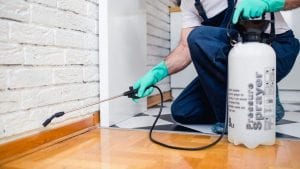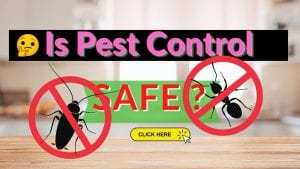Is pest control safe?
Pest control has changed significantly over the years, with regulations introduced in order to make it not only more effective, but much, much safer.
In the past, companies used Organophosphates, which are a type of pesticide that is highly toxic.
It is now deregulated and not used.
Many companies would these dangerous pesticides and spray everywhere inside a property using airborne chemicals to ensure total coverage.
Little to no consideration was given to the safety of it’s occupants.
Not only are pest control companies having to under go rigorous training and licensing requirements. They have also got tighter regulations about what products can be used within the home and around a home to control unwanted pests
Strict Australian Guidelines
In Australia, the law states that all pesticides must be applied in accordance with strict product label directions.
With the advanced tools now allow a pest technician to accurately detect what unwanted insects and rodents are in a house
With this information, they know exactly where to apply the pesticide, and they can use as little as possible and still achieve the desired result.
Because chemicals are applied in a controlled manner and strategically placed within the property.
A home’s occupants are not exposed to the chemicals.
When powder or dust treatments are administered, they can accurately be placed.
Areas like wall cavities, roof voids, under kitchen cabinets and other areas that people and pets do not access.
Ask Your Pest Control Technician What Type Of Chemical They Will Be Using
The company in the lead up should be asking about your family and your pets.
Questions about health issues, such as asthma or any allergies
All pesticides which are used in households must be approved by the APVMA ( Australian Pesticides and Veterinary Medicines Authority ).
Only a true professional pest controller will have this kind of knowledge, and ask you questions such as what kind of pets you have, and adjust the kind of treatment for your house accordingly.
Of course, some chemicals are more toxic than others, however, we only use approved products with a very low mammalian toxicity.
Some products have been known to be more toxic towards cats, such as Deltamethrin.
Ask A Professional Company For Advice
If you a worried about your pets, a quick call to the vet about proposed application method in hand can give you peace of mind and help you decide how to proceed.
If you are pregnant, have a newborn baby or any health concerns that make you reluctant to seek pest control, call your doctor for advice.
Please note – pest control technicians are not doctors and cannot give you medical advice.
It is always best to seek the opinion of your health care professional if you feel uncomfortable.
If you require any additional safety info such as material safety data sheets of the products being used they should have them readily available for you to read them.
Pest control techs are experts in the products they use, and will be glad to explain anything that is confusing to you.
If the pest controller you speak to seems uninformed or uninterested in spending time with you or answering your question or concerns , consider it a red flag.
Consider calling other companies and ask your questions and find a company who can answer your questions.

pest spraying Brisbane
Safety Guidelines Before A Treatment
What happens before, during, and after the treatment are just as important.
Here are some tips to increase the likelihood of a safe pest control session:
Talk to the pest control applicator about the pesticide to be used so you can prepare ahead of time. Let the company know about health concerns. You can mention pregnancy, allergies, and etc. so they can find the best treatment option.
- Cover everything that can be exposed to the pesticide such as plates, toothbrushes, toys, cooking utensils, etc.
- Stay away from the premises for four to six hours. Keep the pets away, too.
- If the pesticide is applied outdoors, make sure all windows and doors are shut.
- If the pesticide is applied indoors, open the windows and doors immediately once you return home.
- Wash and clean everything again prior to using them, especially food utensils
It is also a EPA requirement that all pest control company’s keep record of pesticides used their amount and were they were applied as well as any weather conditions such as wind speed
Extra Steps That Maybe Needed
The company that you hire will have a set of their own guidelines they may ask to implement before the service.
There are 12 major pest types pests (including cockroaches, fleas, termites, mice and ants.)
A treatment is catered to the home, the pest type and extent of the problem.
You should be dealing with expert Pest Managers. They will give you the right advice on how to ensure your your home stays pest free.
They may also suggest things like:
- Steam cleaning your carpets just before the treatment
- Mowing your lawn if you are treating for fleas
- Clearing away excess garden waste and mulch if you have suspected termites
- A full house clean if you have cockroaches
Safe & Effective Pest Control in Brisbane
When you see the team arrive for the treatment, they should all be wearing protective clothing.
If you see someone in shorts and a t-shirt spraying pesticide, they are not professional!
The weather conditions need to be taken into account to ensure that the protection will work
Strong winds will blow away the treatments and heavy rainfall will wash away the products..
The other part of a safe pest control process, is to ensure there is a set time we will be there for the treatment.
You should be advised for how long to be away from your property to minimise the risk to you and your loved ones.
To find an experienced and professional pest control team – Call the Brisbane Pest Control Experts
The Article Is Pest Control Safe For My Family And Pets? First Appeared ON
: https://gqcentral.co.uk

No comments:
Post a Comment